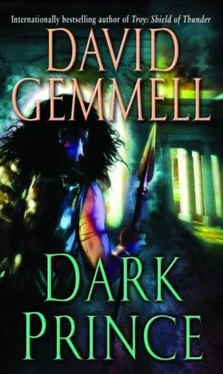'Let us not talk of this any more,' he whispered. 'Tell me of your years here. Let me share them with you.'
He sat and listened as the sun faded from the sky, unaware that his officers had arrived and were standing silently by the doorway. They did not intrude on his obvious grief.
Finally, as the first stars of evening were appearing in the sky, Derae drew in a deep shuddering breath.
And was gone. .
No goodbyes, no tearful farewell. One moment she was alive, the next her soul had departed.
As her breathing stopped Parmenion fell back, and there came over the room a sense of peace that none present would ever forget. It was warm and comforting, uplifting and filled with love, touching heart and mind and soul.
Ptolemy moved forward and embraced his general. The others followed.
And with great gentleness they led the weeping Spartan back to the gardens where his war-horse waited.
In the weeks that followed Parmenion threw all his energies into the planning of the campaign, working from before dawn to after dusk and exhausting even his younger officers. He checked the supplies, ordered cartographers to map the countryside, organized food wagons, sent riders to watch for the Athenian supply ships and arranged billets, pushing himself to his limits.
Attalus tried to reason with him, begging him to slow down, but the Spartan would not be opposed. Ignoring all advice, he pressed on. In the past he had been aided by Mothac, whose organizational skills had been breathtaking.
But now he felt he could trust no one. An army soon to number 30,000 would be moving across the Hellespont.
Horses would require safe pasture, the men would need meat, cereal and water. Battles, in the main, could almost take care of themselves, but keeping men ready for war was an art in itself. A four-ox cart could carry thirty barrels of water across a desert, but the oxen needed to drink and after ten days there would be only fifteen barrels left. Such were the problems in which Parmenion immersed himself to cloak his soul from the pain of Derae's death.
Then there were the squabbles and fights that flared within an army made up of such ancient enemies as Paionians, Illyrians, Macedonians, Athenians and Thracians. Blood feuds were reported daily, and many men were slain in duels. Parmenion and Attalus were often called upon to judge the survivors of such combats and it irked the Spartan to sentence good fighters to death.
But even these considerations were better than the constant, acid thought that Derae had been alive all these years and now had been taken from him for good.
In the mid-afternoon of his fifth week in this outpost of the Persian Empire, scouts brought word of a group of Macedonian officers who had landed from an Athenian ship. There was no sign yet of Philip and Parmenion cursed inwardly.
The Persians had fled before the invading force, and many of the Greek cities had invited the Macedonians to liberate them. Yet Parmenion could not spread the advance army so thin that a counterattack would crush it, and he was forced to wait for the arrival of the King and the rest of the army. This delay, he knew, would soon lead to a weakening of resolve in the cities, and many would withdraw their support.
The Spartan had commandeered a house in the captured city of Cabalia, and this he shared with Attalus. The swordsman had been in fine mood since the invasion and enjoyed sharing the command. In the main the two men got on well, Attalus leaving what he regarded as the minutiae to Parmenion, while he rode out every day hunting or scouting the land ahead.
The old warrior had even become popular with the troops, for he never hesitated to ride at the front of the battle-line and had distinguished himself in the first clashes with the Persian army.
Parmenion pushed the papers across the broad desk and stretched his back. He was tired. Bone-weary. It had not been hard to march into Asia, but a long campaign called for more stamina, nerve and sustained concentration than he had needed for longer than he cared to remember.
Three years was the timetable he had given Philip. Three years to control Asia Minor and make the land safe. Three years and 60,000 troops. This was no small undertaking and, at sixty-four, Parmenion wondered whether he would live out the campaign.
There were so many problems to overcome, foremost among which was food for the army. They had brought supplies for thirty days when they crossed the Hellespont, and two-thirds had already been consumed. Foraging parties were bringing in what could be found locally, but Parmenion was anxious for the supply ships to reach the designated — and defended — bays. Philip had a mere 160 ships. Should the Persian fleet move into the Aegean Sea, the Macedonian vessels would be outnumbered three to one, and the land-based army could be starved into submission or withdrawal.
But even with food supplies assured, there was still the problem of the Persian army. Given time the new King, Darius, could raise an army of almost a million. This was unlikely, Parmenion knew, but even if he chose only to conscript warriors from central Persia the Macedonians would face more than 120,000 well-armed, disciplined men.
Among these were almost 40,000 trained slingers and archers. Even when Philip arrived with reinforcements, the Macedonians would have only around 1,000 bowmen.
Parmenion believed that despite his awesome skills Philip had never truly understood the Persian Empire and its composition.
The Great King ruled from Phrygia in the west to the distant lands of the Hindu Kush, from fertile farmland to arid desert, from ice-covered forests to unpenetrable jungle. But it was the method of his rule that made conquest of the empire so difficult. Satraps and vassal kings were mostly autonomous, raising their own armies and setting local taxes. Even if Philip were to crush Darius he would still have a score of powerful enemies to face, each of them capable of bringing to the field an army greater than Macedon's.
Two million square miles of territory, one hundred different nations. All of Philip's past triumphs would count for nothing against such odds!
The sun was dipping into the west when the Spartan strode through the camp, stopping to examine the picket-lines and the guards who patrolled the horse paddocks. He found one young sentry sitting quietly eating bread and cheese, his helmet and sword beside him. As the boy saw the general he scrambled to his feet.
'I am sorry, sir. I have not had an opportunity to eat today.'
'It is difficult to eat with your throat ripped open,' Parmenion told him. 'This is an enemy land and you have few friends here.'
'I know, sir. It won't happen again.'
'That is true. Next time I find you slacking I shall open your throat myself.'
'Thank you, sir… I mean. .'
'I know what you mean,' grunted the Spartan, moving away.
They were all so young now, beardless children playing a game of war.
For an hour or more he wandered the camp outside the city, then returned to the house. It was white-walled, with beautiful statues lining the walks and gardens, and the rooms were large, the windows tall and wide. The floors were not crafted with mosaics but covered with rugs and carpets, deep and soft beneath the feet. Huge paintings adorned the inner walls, depicting the gods of the Persians, the mighty Ahura Mazda, the Wise Lord, and the minor daevas that served him.
A slave-girl brought the general a pitcher of mead wine made from honey. He accepted a goblet, then dismissed her.
As dusk approached another girl moved in, lighting the copper lamps that hung on the walls. The room was soon bathed in a soft golden glow and the Spartan removed his breastplate and greaves, settling down with his mead on a wide couch.
Читать дальше












